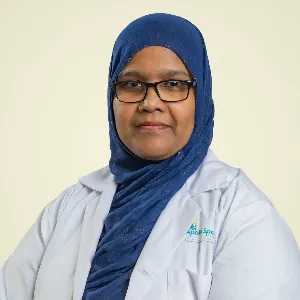Fibroids Treatment in MRC Nagar, Chennai
Fibroids are abnormal, mostly non-cancerous growths that are found within or on a woman’s uterus (womb). Fibroids may or may not have symptoms depending on their size, number and location. The exact cause of fibroids is unknown. Fibroids can vary in size. Relief from symptoms like heavy periods and abdominal pain can be provided with timely and effective treatment. Fibroids may occur as a single or multiple growths but may remain undetected until they exhibit symptoms or are detected during a routine examination.
What are the symptoms of fibroids?
Fibroids may not present with any symptoms unless they are large in size or you have multiple fibroids. In this case, you may experience the following symptoms:
- Heavy bleeding or prolonged periods with blood clots, accompanied by menstrual cramping
- Pelvic and lower back pain
- Frequent urination
- You may experience pain during intercourse
- Difficulty in getting pregnant
- Swelling, enlargement or pressure in your abdomen
What are the causes of fibroids?
The exact cause of fibroid development is unknown, but certain factors can influence their growth.
- Hormones - The hormones produced in the ovaries are estrogen and progesterone. The increased levels of estrogen can result in fibroid development. Both these hormones are vital in the uterine lining regeneration during your menstrual cycle and can result in the stimulation of fibroid growth.
- Family history - If someone in your family has fibroids, you may have an increased risk of developing them.
- Pregnancy - During pregnancy, your estrogen and progesterone levels increase which results in an increased risk of growth and development of fibroids during this stage.
When should you consult a doctor?
In case you experience severe, unrelieved pelvic pain, spotting or bleeding between periods, prolonged, heavy or painful periods, difficulty in urination or tiredness due to anemia (low red blood cell count), do not hesitate to contact your doctor. Seek urgent medical help if you experience sudden, severe, vaginal bleeding or pelvic pain.
If you require any further clarifications, you can search for a fibroids specialist near me, fibroids hospital near me or
request an appointment at Apollo Spectra Hospitals, MRC Nagar, Chennai.
Call 1860 500 2244 to book an appointment.
What is the treatment for fibroids?
Your doctor may advise a combination of treatments depending upon your age, size of the fibroid and your general health.
Dietary and lifestyle changes - Avoiding high-calorie foods and meat and opting for healthier food choices are advised. You can manage your stress levels and exercise if you are overweight.
Medications - Medications to reduce the size of your fibroid or to reduce your symptoms of pain and help control your bleeding such as birth control pills, painkillers and intrauterine devices may be advised.
Surgery - In some cases, surgery may be required to remove multiple fibroids. In cases of recurrent fibroids, even after surgical intervention, your doctor may advise removal of your uterus (hysterectomy). Non-invasive or minimally invasive procedures may be done to destroy the fibroids, shrink the fibroids or cut off the blood supply to the fibroids.
If you have any doubts, do not hesitate to search for fibroids doctors near me, fibroids hospital in Chennai or
request an appointment at Apollo Spectra Hospitals, MRC Nagar, Chennai.
Call 1860 500 2244 to book an appointment.
Conclusion
Fibroids are abnormal growths which may develop in a woman’s uterus. These fibroids may not cause symptoms and may go undetected. You may not require treatment if your fibroids are small or do not show symptoms. Depending on the size, location of the fibroid, your age and overall health, your doctor will decide on your treatment plan.
Family history, pregnancy, age and increased body weight are the risk factors for fibroids.
Fibroids are diagnosed with a pelvic examination performed by your gynecologist. This will help ascertain the size and shape of your uterus. Certain tests like ultrasound and a pelvic MRI can help diagnose the size and location of your fibroid.
Fibroids can cause heavy bleeding leading to anemia. Large fibroids can cause kidney damage. Infertility and repeated pregnancy loss are other complications.
Though fibroids cannot be prevented, making healthier lifestyle choices such as exercising, maintaining healthy body weight, eating fresh fruits and vegetables, consuming a high-fiber diet and decreasing the intake of high-fat and high sugar content foods may help reduce your fibroid risk. Some research also suggests that hormonal contraceptive use may lower your risk of fibroids.
Symptoms
Our Doctors
DR. CHELLAMMAL K R
MBBS, MD (OBSTETRICS...
| Experience | : | 24 Yeras Experience |
|---|---|---|
| Speciality | : | Obstetrics and Gynae... | Location | : | Alwarpet |
| Timings | : | Available on prior a... |
DR. MEENAKSHI SUNDARAM
MD,DNB, DIPLOMA IN A...
| Experience | : | 17 Yeras Experience |
|---|---|---|
| Speciality | : | Obstetrics & Gynaeco... | Location | : | Alwarpet |
| Timings | : | Mon - Sat: 4:30 PM t... |
DR. DHWARAGA
M.B.B.S, DGO,MS...
| Experience | : | 10 Yeras Experience |
|---|---|---|
| Speciality | : | Obstetrics & Gynaeco... | Location | : | MRC Nagar |
| Timings | : | Available by prior a... |
DR. ANILASRE ATLURI
M.S.(OBG), FMAS, DMA...
| Experience | : | 13 Yeras Experience |
|---|---|---|
| Speciality | : | Obstetrics & Gynaeco... | Location | : | Alwarpet |
| Timings | : | Mon - Sat (11:00 AM ... |
DR. MEERA RAGHAVAN
MBBS, DNB...
| Experience | : | 23 Yeras Experience |
|---|---|---|
| Speciality | : | Obstetrics & Gynaeco... | Location | : | Alwarpet |
| Timings | : | Tue, Thur, Sat: 2:30... |
DR. G RADHIKA
MBBS, DGO, DNB (O&G)...
| Experience | : | 14 Yeras Experience |
|---|---|---|
| Speciality | : | Obstetrics & Gynaeco... | Location | : | Alwarpet |
| Timings | : | Mon - Sat : 10:00 AM... |
DR MEENAKSHI B
MBBS,DGO,FMAS...
| Experience | : | 10 Yeras Experience |
|---|---|---|
| Speciality | : | Obstetrics & Gynaeco... | Location | : | MRC Nagar |
| Timings | : | Mon - Sat : 6:30 PM ... |
DR SULTHANA NASEEMA BANU N N
MBBS, MS, DNB, FMAS...
| Experience | : | 5 Yeras Experience |
|---|---|---|
| Speciality | : | Obstetrics & Gynaeco... | Location | : | MRC Nagar |
| Timings | : | Mon - Sat : 8:30 AM ... |
Our Top Specialities
NOTICE BOARD
CONTACT US
CONTACT US
 Book Appointment
Book Appointment










.svg)
.svg)
.svg)
.svg)








